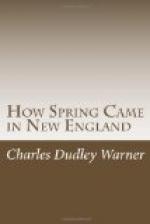This low pressure is a creation of Old Prob. What is that? Old Prob. is the new deity of the Americans, greater than AEolus, more despotic than Sans-Culotte. The wind is his servitor, the lightning his messenger. He is a mystery made of six parts electricity, and one part “guess.” This deity is worshiped by the Americans; his name is on every man’s lips first in the morning; he is the Frankenstein of modern science. Housed at Washington, his business is to direct the storms of the whole country upon New England, and to give notice in advance. This he does. Sometimes he sends the storm, and then gives notice. This is mere playfulness on his part: it is all one to him. His great power is in the low pressure.
On the Bexar plains of Texas, among the hills of the Presidio, along the Rio Grande, low pressure is bred; it is nursed also in the Atchafalaya swamps of Louisiana; it moves by the way of Thibodeaux and Bonnet Carre. The southwest is a magazine of atmospheric disasters. Low pressure may be no worse than the others: it is better known, and is most used to inspire terror. It can be summoned any time also from the everglades of Florida, from the morasses of the Okeechobee.
When the New-Englander sees this in his news paper, he knows what it means. He has twenty-four hours’ warning; but what can he do? Nothing but watch its certain advance by telegraph. He suffers in anticipation. That is what Old Prob. has brought about, suffering by anticipation. This low pressure advances against the wind. The wind is from the northeast. Nothing could be more unpleasant than a northeast wind? Wait till low pressure joins it. Together they make spring in New England. A northeast storm from the southwest!—there is no bitterer satire than this. It lasts three days. After that the weather changes into something winter-like.
A solitary song-sparrow, without a note of joy, hops along the snow to the dining-room window, and, turning his little head aside, looks up. He is hungry and cold. Little Minnette, clasping her hands behind her back, stands and looks at him, and says, “Po’ birdie!” They appear to understand each other. The sparrow gets his crumb; but he knows too much to let Minnette get hold of him. Neither of these little things could take care of itself in a New-England spring not in the depths of it. This is what the father of Minnette, looking out of the window upon the wide waste of snow, and the evergreens bent to the ground with the weight of it, says, “It looks like the depths of spring.” To this has man come: to his facetiousness has succeeded sarcasm. It is the first of May.




